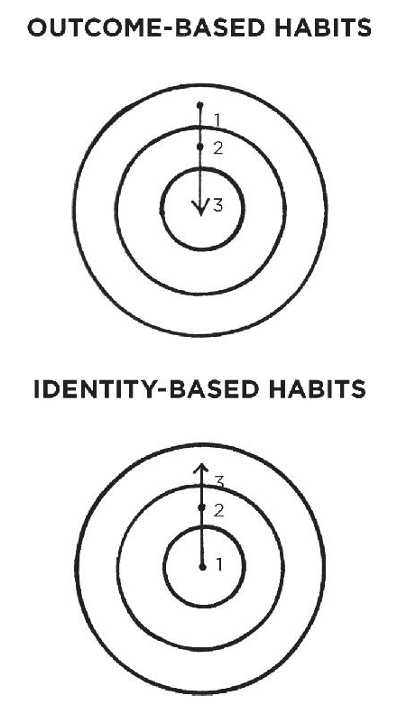
Atomic Habits
こんばんは。
今日は、私が最近読んだ「Atomic Habits」という本についてご紹介したいと思います。この本は、ジェームズ・クリアーさんが書いたもので、習慣の力について詳しく解説されています。日常生活や目標達成において、小さな習慣がいかに大きな影響を与えるかを、実例や科学的な裏付けを交えて説明しています。
読んでいるうちに、心に響く言葉や新しい視点がたくさんありました。そこで今回は、私が特に感銘を受けた10つの文章を抜粋して、それぞれ和訳をつけて紹介したいと思います。これらの言葉が、皆さんの習慣づくりや日常生活の中で少しでもお役に立てば嬉しいです。
それでは、さっそく始めましょう。
1. 1% BETTER EVERY DAY/毎日1%の改善

The difference a tiny improvement can make over time is astounding. Here’s how the math works out: if you can get 1 percent better each day for one year, you’ll end up thirty seven times better by the time you’re done. Conversely, if you get 1 percent worse each day for one year, you’ll decline nearly down to zero. What starts as a small win or a minor setback accumulates into something much more.
(小さな改善が時間をかけてもたらす違いは驚くべきものです。計算はこうです:もし毎日1%ずつ良くなれば、1年後には37倍良くなります。逆に、毎日1%ずつ悪くなれば、ほぼゼロに近づいてしまいます。小さな成功や些細な挫折が、積み重なると大きな結果になります。)
2. THE PLATEAU OF LATENT POTENTIAL/潜在能力の停滞期

Habits often appear to make no difference until you cross a critical threshold and unlock a new level of performance. In the early and middle stages of any quest, there is often a Valley of Disappointment. You expect to make progress in a linear fashion and it’s frustrating how ineffective changes can seem during the first days, weeks, and even months. It doesn’t feel like you are going anywhere. It’s a hallmark of any compounding process: the most powerful outcomes are delayed.
(習慣はしばしば、重要な閾値を超えて新しいパフォーマンスレベルに到達するまでは、何の変化もないように見えます。どんな取り組みの初期段階や中間段階には、多くの場合、「失望の谷」があります。私たちは進歩が直線的に進むことを期待しますが、最初の数日、数週間、さらには数ヶ月の間は、変化が効果がないように思えて苛立ちます。まるでどこにも向かっていないように感じます。これは複利のプロセスの特徴であり、最も強力な結果は遅れてやってくるのです。)
3. FORGET ABOUT GOALS, FOCUS ON SYSTEMS INSTEAD/ 目標は忘れて、システムに集中しよう
Goals are about the results you want to achieve. Systems are about the processes that lead to those results.(目標は、達成したい結果を指します。一方、システムは、その結果に至るためのプロセスを指します。)
The purpose of setting goals is to win the game. The purpose of building systems is to continue playing the game.(目標を立てることの目的は、ゲームに勝つことですが、システムを構築する目的は、ゲームを続けることです。)
You do not rise to the level of your goals. You fall to the level of
your systems.(成功は目標の達成ではなく、システムのレベルによって決まります。)
4. OUTCOME-BASED HABITS VS IDENTITY-BASED HABITS/ 結果志向の習慣とアイデンティティ志向の習慣

The ultimate form of intrinsic motivation is when a habit becomes part of your identity. It’s one thing to say I’m the type of person who wants this. It’s something very different to say I’m the type of person who is this.
■ The goal is not to read a book, the goal is to become a reader.
■ The goal is not to run a marathon, the goal is to become a runner.
■ The goal is not to learn an instrument, the goal is to become a musician.
(最終的な内在的動機づけの究極の形は、習慣が自分のアイデンティティの一部になったときです。これは、私はこれを望むタイプの人間だと言うこととは一線を画します。私はこれをするタイプの人間だと言うことは、非常に異なるものです。
■ 目標は本を読むことではなく、読書家になることです。
■ 目標はマラソンを走ることではなく、ランナーになることです。
■ 目標は楽器を学ぶことではなく、ミュージシャンになることです。)
5. THE TWO-STEP PROCESS TO CHANGING YOUR IDENTITY/自己のアイデンティティを変える2つのステップ
It is a simple two-step process:
1. Decide the type of person you want to be.
2. Prove it to yourself with small wins.
(1. あなたがなりたいと思う人のタイプを決める。
2. 小さな成功を通じてそれを自分自身に証明する。)
6. BE SPECIFIC/具体化する
People who make a specific plan for when and where they will perform a new habit are more likely to follow through.
The simple way to apply this strategy to your habits is to fill out this sentence: I will [BEHAVIOR] at [TIME] in [LOCATION].
■ Meditation. I will meditate for one minute at 7 a.m. in my kitchen.
■ Studying. I will study Spanish for twenty minutes at 6 p.m. in my bedroom. ■ Exercise. I will exercise for one hour at 5 p.m. in my local gym.
■ Marriage. I will make my partner a cup of tea at 8 a.m. in the kitchen.
(新しい習慣を実行する際に、具体的な計画を立てる人は、その計画に従う可能性が高くなります。この戦略を習慣に適用する簡単な方法は、次の文を埋めることです。
「私は[行動]を[時間]に[場所]で行います」。
■ 瞑想。午前7時に私の台所で1分間瞑想します。
■ 勉強。午後6時に自分の部屋でスペイン語を20分間勉強します。
■ 運動。午後5時に地元のジムで1時間運動します。
■ 結婚。午前8時にキッチンでパートナーにお茶を一杯入れます。)
7. Motivation Is Overrated; Environment Often Matters More/モチベーションよりも環境が重要
Environment design is powerful not only because it influences how we engage with the world but also because we rarely do it. Most people live in a world others have created for them. But you can alter the spaces where you live and work to increase your exposure to positive cues and reduce your exposure to negative ones. Environment design allows you to take back control and become the architect of your life. Be the designer of your world and not merely the consumer of it.
(環境設計は、世界との関わり方に影響を与えるだけでなく、ほとんどの人がそれを行わないだけにさらに強力です。多くの人は、他者が作り上げた世界の中で生活しています。しかし、あなたは自分の住環境や職場の環境を変えることで、ポジティブな刺激を受けやすくし、ネガティブな刺激を減らすことができます。環境設計によって、自分の人生を自らデザインすることができるのです。自分の世界のデザイナーになり、単なる消費者にとどまらないようにしましょう。)
8. Habits Form Based On Frequency, Not Time/ 習慣は時間ではなく頻度に基づいて形成される

There is nothing magical about time passing with regard to habit formation. It doesn’t matter if it’s been twenty-one days or thirty days or three hundred days. What matters is the rate at which you perform the behavior. You could do something twice in thirty days, or two hundred times. It’s the frequency that makes the difference. Your current habits have been internalized over the course of hundreds, if not thousands, of repetitions. New habits require the same level of frequency. You need to string together enough successful attempts until the behavior is firmly embedded in your mind and you cross the Habit Line.
(習慣が形成されるには、時間の経過には何の魔法もありません。21日経ったとか30日経ったとか、300日経ったとか、そんなことは大したことではありません。重要なのは、その行動をどれだけ頻繁に行うかです。30日間で2回やるのと、200回やるのとでは全く違います。重要なのは、その頻度なのです。今の習慣は何百回、何千回もの反復の中で内面化されてきました。新しい習慣も同じくらいの頻度が必要です。成功した試みを多く積み重ねることで、行動が心にしっかりと刻まれ、習慣のラインを越えられるようになります。)
9. The Two-Minute Rule/2分のルール

When you start a new habit, it should take less than two minutes to do.
■ "Read before bed each night" becomes "Read one page."
■ "Do thirty minutes of yoga" becomes "Take out my yoga mat."
■ "Study for class" becomes "Open my notes."
■ "Fold the laundry" becomes "Fold one pair of socks."
■ "Run three miles" becomes "Tie my running shoes."
(新しい習慣を始めるときは、その行動が2分以内で完了するようにするべきです。
■ 「毎晩寝る前に読書する」という習慣は、「1ページ読む」になります。■ 「30分のヨガをする」という習慣は、「ヨガマットを出す」になります。■ 「授業の勉強をする」という習慣は、「ノートを開く」になります。
■ 「洗濯をたたむ」という習慣は、「1組の靴下をたたむ」になります。
■ 「3マイル走る」という習慣は、「ランニングシューズを締める」になります。)
10. Never Miss Twice/二度も失敗しない
If I miss one day, I try to get back into it as quickly as possible. Missing one workout happens, but I’m not going to miss two in a row. Maybe I’ll eat an entire pizza, but I’ll follow it up with a healthy meal. I can’t be perfect, but I can avoid a second lapse. As soon as one streak ends, I get started on the next one. The first mistake is never the one that ruins you. It is the spiral of repeated mistakes that follows. Missing once is an accident. twice is the start of a new habit.
(1日休んだら、できるだけ早く再開しようとします。1回のワークアウトを逃すことはあるけど、2回連続で逃すつもりはありません。ピザを丸ごと一つ食べてしまうかもしれませんが、それには健康的な食事を続けます。完璧ではないかもしれませんが、2回目の失敗は避けることができます。1つの連続が終わったら、次の連続を始めます。最初の間違いがあなたを台無しにすることはありません。それに続く繰り返された間違いのスパイラルこそが問題です。1回欠席するのは偶然ですが、2回目は新しい習慣の始まりです。)
以上が、私が「Atomic Habits」から特に感銘を受けた10つの文章です。この本が、皆さんの生活や習慣の改善に少しでも役立てば幸いです。読んでいただき、ありがとうございました!
この記事が気に入ったらサポートをしてみませんか?
